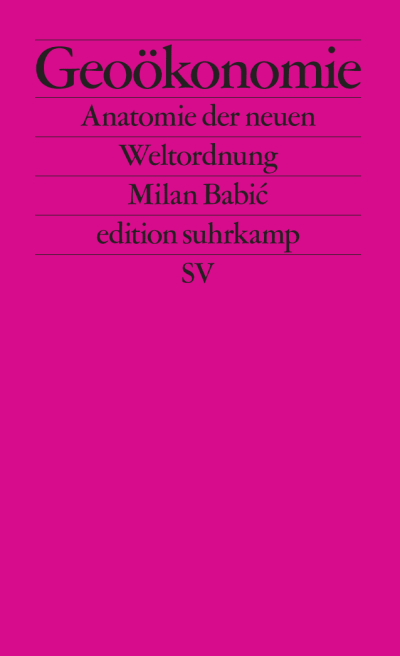Geoeconomics / Geoökonomie
Anatomy of the New World Order
What comes after neoliberal globalisation?
When the effects of the COVID19 pandemic revealed the fragility of global supply chains, people quickly began to talk of a process of »de-globalisation«. The rise of China has led some politicians and commentators to demand protectionist measures. And against the backdrop of growing international tensions, many feel we are witnessing a return of geopolitics.
Milan Babić, however, believes it is overly simplistic to conclude from this that neoliberal globalisation is over and that the...
Milan Babić, however, believes it is overly simplistic to conclude from this that neoliberal globalisation is over and that the...
Read more
When the effects of the COVID19 pandemic revealed the fragility of global supply chains, people quickly began to talk of a process of »de-globalisation«. The rise of China has led some politicians and commentators to demand protectionist measures. And against the backdrop of growing international tensions, many feel we are witnessing a return of geopolitics.
Milan Babić, however, believes it is overly simplistic to conclude from this that neoliberal globalisation is over and that the (nation) state is back. States are not abandoning transnational networks just yet. Rather, we are experiencing a regionalisation that is in part a response to economic imperatives. And when it comes to the battle for global infrastructure, private enterprises continue to be key players. According to Babić, anyone who wants to understand the emerging world order must therefore look at it from the perspective of geoeconomics.
Milan Babić, however, believes it is overly simplistic to conclude from this that neoliberal globalisation is over and that the (nation) state is back. States are not abandoning transnational networks just yet. Rather, we are experiencing a regionalisation that is in part a response to economic imperatives. And when it comes to the battle for global infrastructure, private enterprises continue to be key players. According to Babić, anyone who wants to understand the emerging world order must therefore look at it from the perspective of geoeconomics.
»You ought to have read [Babić's] Anatomy of the New World Order if you want to be able to assess the significance of Trump’s tariffs policy and the chances of success for the new federal government.« Oliver Weber, Süddeutsche Zeitung
»The new order is contradictory, sometimes chaotic … If you want to understand it, Milan Babić is recommended reading.« Anne Aschenbrenner, Buchkultur
»The new order is contradictory, sometimes chaotic … If you want to understand it, Milan Babić is recommended reading.« Anne Aschenbrenner, Buchkultur
»You ought to have read [Babić's] Anatomy of the New World Order if you want to be able to assess the significance of Trump’s tariffs policy and the chances of success for the new federal government.« Oliver Weber, Süddeutsche Zeitung
»The new order is contradictory, sometimes chaotic … If you want to understand it, Milan Babić is recommended reading.« Anne Aschenbrenner, Buchkultur
»The new order is contradictory, sometimes chaotic … If you want to understand it, Milan Babić is recommended reading.« Anne Aschenbrenner, Buchkultur
2025, 237 pages
Persons
Milan Babić
Author
Milan Babić was born in 1990 and is an associate professor of political economy at the University of Amsterdam. His research interests include the power resources of global corporations and the decarbonisation of large, state-owned enterprises.
Milan Babić
Author
Milan Babić was born in 1990 and is an associate professor of political economy at the University of Amsterdam. His research interests include the...
© Sophie Nadolski
